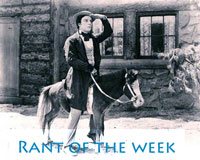
Sometimes, as in the movie "The Wrestler", real personal history and
artistic expression intersect in surprising and intriguing ways.
Marianne Faithful started out her career with a breathy little alto, singing
delicate little folky love songs and mournful ballads. Then came the
years of drug use, the scandals, and the disappearance. Ten years
later she reappears... and sounds like Tom Waits:
Could have come
through anytime,
Cold lonely, puritan
What are you fighting for ?
Its not my security.
Broken English is an amazing enema of an album, a purging of all the demons
of the 1960's and 70's, and a profound statement that this woman was no
longer the doe-eyed naïf of
those painful appearances on Hullabaloo-- it features the most caustic
and bitter break-up song ever: "Why D'ya Do What Ya Did".

February 12, 2009
One of the better album titles of the last fifty years: Marianne
Faithful's "Broken English", 1979.
Songs allegedly written about or influenced by Marianne Faithful:
Wild Horses, You Can't Always Get What You Want (Rolling Stones)

Has any performer ever looked
as uncomfortable and confused on stage as Marianne Faithful in 1965?
Here she is
awkwardly lip-synching on some television show or another. "What am I doing
here?"
There's a hell of a movie in her life, much of it not
pretty. Partly descended from Austro-Hungarian nobility, her parents
divorced when she was six and she spent time in a convent school. She
was "discovered" at 18 by Andrew Loog Oldham-- what a great name!-- and
propelled to stardom. By "propelled" I mean, it was all arranged.
I mean, she was hot looking, and connected, so it all could be arranged.
You will be on TV. You will be on the cover of magazines. You
will learn to sing.
She married, had a baby, left her husband to
live with one of the Rolling Stones-- she tried three before settling on
Mick-- was arrested wearing only a fur rug at a scandalous party at Keith
Richard's house, lost custody of her son, declined into cocaine addiction,
broke up with Mick.... Some time during those lost years, her mother
attempted suicide, and Marianne Faithful disappeared off the radar screen,
except for one eerie appearance with David Bowie, singing, of all things, "I
got You Babe".
But it is that first video I'm mainly interested in. This was an
era in which powerful men who controlled the music industry made and broke
stars. Marianne Faithful was never a particularly good singer, but she
was strikingly beautiful. In the first video, you can see that she
doesn't have much of a stage presence either. It feels painful just to
watch her sitting there, looking like she was petrified of losing her
timing. The audience was not expected to notice or care that she
wasn't actually singing or performing-- she was lip-synching.
Brian Epstein mis-managed the Beatles around the same time. He
steered them into signing horribly disadvantageous contracts, but wasn't shy
about paying himself extremely generously. It was part of the music
industry culture of the time. The artists had one thing in common.
They were young and they knew nothing about how the music industry worked.
The music companies lavished cash and luxury on them-- the cost of doing
business, which was the business of ripping off the talent-- and the law did not protect their interests then and it doesn't protect them
today.
In fact, it's far worse.
All Contents Copyright
© Bill Van Dyk
2009 All Rights Reserved
Font: Verdana


